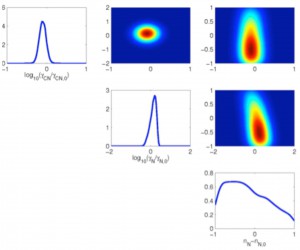Uncertainty Quantification
While the turbulent combustion simulations pursued in ExaCT represent a first order computational challenge for which exascale computation will be enabling, use of such simulations for scientific discovery and technological impact will also require integrating them with advanced algorithms to compute sensitivities and uncertainty. These analyses depend on the variation of the simulation outputs with the inputs.
To make uncertainty quantification practical on large-scale complex simulation models, we need to operate on more information than simple point evaluations of the mapping from the inputs to the outputs of interest. Two broad approaches will be pursued for this: (1) use of derivatives of the input-output map, and (2) use of polynomial chaos expansions (PCE). As discussed below, the co-design process provides an opportunity to develop the hardware, software, programming model and algorithmic support for these analytic approaches.
There are several codesign opportunities associated with uncertainty quantification. First support for the computation of both sensitivity derivatives and PCE representations can be provided by low-level software tools that map them efficiently onto advanced exascale hardware. Second, integration of uncertainty quantification information to support scientific discovery can effectively be performed by in situ analysis using SDMA tools. Finally, the computation of adjoint sensitivities in transient flows, such as turbulence, places great demands on storage and I/O, which will also be supported through exascale SDMA tools.
The application of advanced tools for uncertainty quantification in DNS of turbulence combustion will enable the investigation of how important events in turbulence combustion, such as extinction and ignition, are dependent on particular turbulence and chemical characteristics of the flow. It will also enable exploration of the mechanisms leading to trace species generation (i.e. polutants) and how they might be manipulated.
For more information, please contact Dr. Robert Moser of University of Texas at Austin at [email protected].
Other relevant links:


